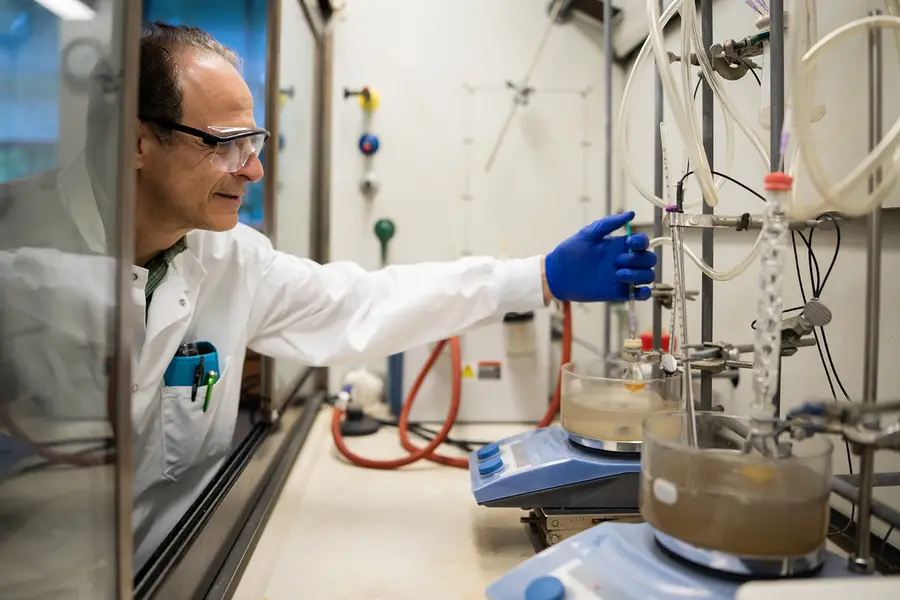Insights
READDI Forethought Team Advances Drug Discovery Campaigns

George Amato, medicinal chemist in drug discovery at RTI International, is a researcher on the multi-institutional READDI Forethought team, which also includes scientists from UNC-Chapel Hill, Duke, NCCU, and NC State University.
The benefits of collaboration are paying off. Four years after the launch of Forethought: The RTI $5M+ Research Collaboration Challenge, the awardee — the Rapidly Emerging Antiviral Drug Development Initiative (READDI), leading an effort to develop new antiviral drugs to combat future pandemics — is driving two drug discovery campaigns toward investigational new drug (IND) status.
For the primary campaign, the team validated a target and identified a promising “hit” compound, which the group’s medicinal chemists are optimizing by making it more potent, more specific, and non-toxic. It is intended as a treatment for diseases caused by coronaviruses. The team began a second drug campaign to advance a recently identified backup target, which they say may have wider applications across other virus families.
Collaboration as catalyst
In 2021 RTI launched the Forethought Challenge with the goal of supporting bold, innovative project proposals that address critical societal challenges through regional collaboration in North Carolina. The awardee, READDI, brought together a consortium of local research institutions working to develop new antiviral drugs to combat future pandemics. This drug discovery team includes virologists from the University of North Carolina at Chapel Hill and Duke University, a UNC-Chapel Hill computational biologist, a drug-screening expert from North Carolina Central University and, from RTI, medicinal chemists and research pharmacologists with expertise in drug discovery.
The Research Triangle-based READDI develops small-molecule antiviral medicines that work against entire virus families. These “broad-spectrum” drugs prevent viruses from infecting and replicating, thereby reducing severe illness and death in individuals and slowing viral spread.
Host-directed antivirals
For the Forethought Challenge, READDI and its partners focused on the coronavirus family, which has led to several deadly disease outbreaks — Severe Acute Respiratory Syndrome (SARS) in 2003, Middle Eastern Respiratory Syndrome (MERS) in 2013, and Coronavirus Disease 19 (COVID-19) in 2020. Instead of aiming for druggable targets on the viruses themselves, they sought host-cell proteins that are critical for viral replication. Among other advantages, host-directed antiviral drugs reduce the risk of drug resistance.
But human cells are complex, containing tens of thousands of proteins. To narrow the list of potential host-cell targets, the team leveraged the partner institutions’ diverse fields of expertise.
The virologists and computational biologists began by developing a system for analyzing a huge amount of data, and turning that into a prioritized set of potential targets.
“We took a first-principles approach,” says virologist and READDI co-founder Dr. Nat Moorman, associate professor at the UNC School of Medicine. “We considered all things that had been implicated at one level or another in disease caused by coronaviruses — basically everything that could be measured in a cell at a genome-wide level.”
Once they had narrowed down the set of potential targets, the RTI researchers used medicinal chemistry and pharmacological expertise to choose the most promising target. The team then built a drug discovery program to develop a lead compound.
“By utilizing our expertise in small molecule drug discovery and pharmacology, we have made great strides towards developing novel molecules to target these proteins by taking a considered team approach,” says Scott Runyon, director of organic and medicinal chemistry at RTI.
The multidisciplinary expertise has allowed the READDI Forethought team to be deliberate and methodical in its approach. “During the pandemic, a lot of researchers simply tested existing compounds or tried to repurpose current antiviral drugs, hoping to get lucky,” Moorman says. Many of those efforts failed. “We have been more intentional, working through target hypothesis and validation.”
The next measure of success, Moorman says, is a molecule on its way to clinical trials. The ultimate goal is a drug that is broadly effective against coronaviruses — those viruses we know about and those that have yet to emerge.
Forethought: The RTI $5M+ Research Collaboration Challenge was developed by RTI and the RTI Board of Governors University Research Collaboration Committee (URCC) to build on a foundation of investments in successful university collaborations and help stimulate transformational change for the region, contributing to the distinctive intellectual and institutional resources and capabilities of the Research Triangle region.
READDI leveraged RTI’s support, along with initial funding from UNC-Chapel Hill and the NC Collaboratory, to raise additional funds from the National Institutes of Health, the U.S. military, and the North Carolina General Assembly.
“Developing effective broad-spectrum antivirals is a challenge bigger than any single lab, institution, or company,” says READDI CEO James Rosen. “We are grateful for RTI’s foresight and funding in launching this important collective effort.”
Disclaimer: This piece was written by Katie Bowler Young (Senior Director of University Collaborations) and Logan Ward (Director of Communications) to share perspectives on a topic of interest. Expression of opinions within are those of the author or authors.


